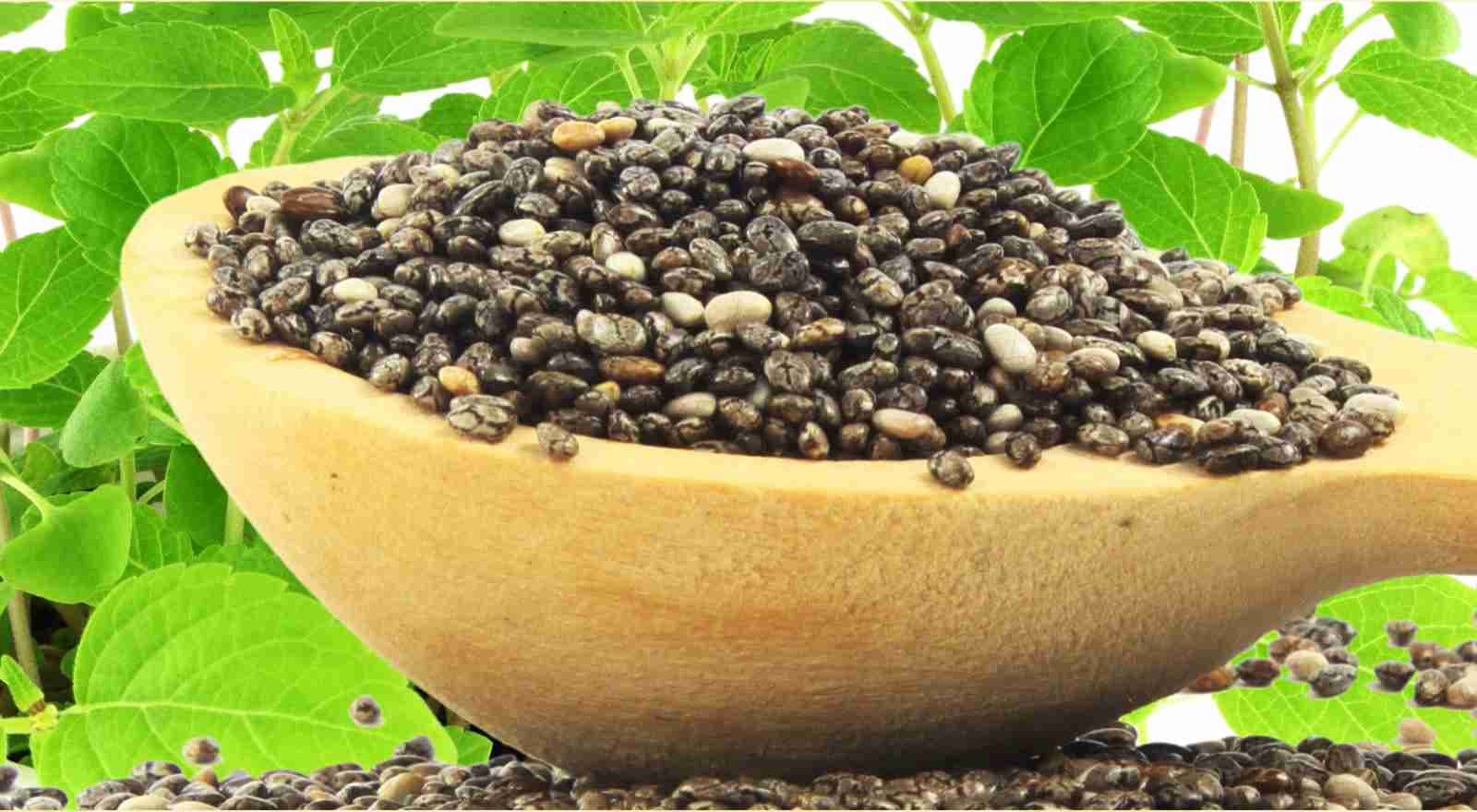Are you often bothered by that uncomfortable burning feeling in your stomach, the persistent indigestion, or that uneasy feeling that feels frustrating? People who experience gastritis symptoms recognise them fully well. While medications give temporary relief, you can use chia seeds for gastritis management to support long-term healing. The tiny seeds contain high fibre, omega-3s, and antioxidants that minimise inflammation, shield the stomach lining, and enhance digestion.
When you mix them in water, these seeds form a gelatinous substance that acts as a protective shield against stomach acid irritation. Everyone can benefit from chia seeds by turning them into healthy drinks or tasty puddings. In this blog, let's explore five benefits of chia seeds for gastritis and learn how to use them effectively to get relief and better gut health.
Table Of Contents
1. Are Chia Seeds Good For Gastritis? 5 Benefits
2. How To Use Chia Seeds For Gastritis: 5 Healthy Ways
3. Do Chia Seeds Soak Up Stomach Acid?
4. The Final Say
5. FAQs
6. References
Are Chia Seeds Good For Gastritis? 5 Benefits

Consider these five benefits of chia seeds for gastritis when dealing with an inflamed stomach lining:
1. Reduces Stomach Lining Inflammation
The main effect of gastritis is inflammation of the stomach lining, which results in common discomfort and irritation. Chia seeds contain omega-3s and antioxidants that decrease stomach inflammation while safeguarding inner walls. Soaking chia seeds in water develops gel formations on the stomach lining, which promotes healing and minimises irritation.
Also Read: Anti-Inflammatory Diet Plan And Tips to Reduce Inflammation
2. Improves Gut Microbiota Health
The body needs a balanced and healthy gut microbiome for smooth digestion and the prevention of stomach inflammation. When you consume chia seeds, the prebiotic fibres in the seeds aid the growth of helpful gut bacteria, thus enhancing your digestive system's condition. These high-protein seeds also strengthen gastrointestinal balance.
3. Reduces Oxidative Stress In The Cells
The harmful molecules called free radicals produce oxidative stress, which causes worsened gastritis symptoms and gradual stomach cell degeneration. The antioxidants in chia seeds, particularly quercetin and flavonoids, protect stomach tissues by neutralising harmful radicals. Regularly consuming chia seeds smoothie decreases oxidative stress within the stomach tissue for better healing.
Try ToneOp Care's Gastro Health Care Combo, a proven solution to manage digestive issues like indigestion, constipation, bloating, and acidity symptoms and improve your digestive health. This combo can improve food absorption, support IBS management, and enhance metabolism and liver function. Try it for 60 days and experience its positive impact on your digestive wellness.
4. Helps Absorb Excess Stomach Acid
Large amounts of stomach acid intensify gastritis symptoms by creating acid-based pain, which causes discomfort. Soluble fibre from chia seeds binds extra stomach acid, thus forming a protective barrier in the digestive organs. Consuming oatmeal with chia seeds helps enhance their protective effect in a meal by increasing fibre. A daily habit of eating porridge prevents stomach acid levels from rising all day.
5. Supports Digestive Tract Function
The proper functioning of digestion prevents gastritis symptoms such as bloating and indigestion. Daily consumption of chia seeds leads to easy digestion because they manage bowel movements while stopping cases of constipation. The combination of Chia seeds in your morning drink will help detox your digestive system, eliminate toxins, and benefit your digestive system.
How To Use Chia Seeds For Gastritis: 5 Healthy Ways
Try these five healthy ways to use chia seeds for gastritis relief, keeping in mind the need for gentle digestion and hydration:
1. Chia Water
This is the simplest and often the most gentle way to consume chia seeds. The soaked seeds are easier to digest, and the gel may help coat and soothe the irritated stomach lining. It also provides hydration.
How To Use:
- Add 1-2 teaspoons of chia seeds to a glass (8-10 ounces) of lukewarm or room-temperature water.
- Stir well for 15-20 minutes. You can add a very small squeeze of fresh ginger juice, but avoid acidic additions like lemon or lime.
2. Chia Seed Pudding
Chia pudding is soft, easy to digest, and provides sustained energy. Non-dairy milk is a healthier food swap, gentler on the stomach than dairy for some individuals with gastritis, and the soluble fibre in chia seeds creates a soothing texture.
How To Use:
- Mix 2-3 tablespoons of chia seeds with 1 cup of plain non-dairy milk (like almond, oat, or coconut).
- For flavour, you can add a small amount of mashed ripe banana.
- Stir well, cover, and refrigerate overnight.
3. Chia Gel In Smoothies
Smoothies can be easy to digest, and the pre-soaked chia seeds add fibre and nutrients without being too abrasive. Drink slowly. Pay attention to how your stomach reacts to the other ingredients in the smoothie.
How To Use:
- Soak 1-2 teaspoons of chia seeds in around ¼ cup of water for at least 15 minutes to form a gel.
- Then, blend this gel into a smoothie made with gut-friendly ripe banana, cooked and cooled sweet potato, non-dairy yoghurt (if tolerated), and a small amount of ginger.
Try ToneOp Care's raw, unroasted Sunflower Seeds and Pumpkin Seeds products as a nutritious snack with balanced nutrients. You can also top it in your smoothies as they provide enough protein to support your body and keep you energised without the excess calories.
4. Chia Seeds in Soups
This is a subtle way to enjoy the benefits of chia seeds without a significant change in texture. The fibre helps with satiety, and the omega-3s offer mild anti-inflammatory benefits.
How To Use:
- After cooking vegetable soup (avoiding spicy ingredients, tomatoes, and excessive onions/garlic), stir in 1-2 teaspoons of dry chia seeds.
- Let it simmer for a few minutes until the seeds slightly thicken the soup.
5. Chia Seeds Mixed With Soft Foods
This allows you to introduce chia seeds slowly and observe your body's reaction. The soaked seeds are gentler and less likely to cause digestive upset.
How To Use:
- Sprinkle a minimal amount (½ - 1 teaspoon) of soaked chia seeds onto other bland, soft foods like plain mashed potatoes, well-cooked oatmeal (made with non-dairy milk), or a small portion of plain rice.
Also Read: What Is A Raw Food Diet 10 Amazing Benefits | ToneOp Fit
Do Chia Seeds Soak Up Stomach Acid?
Absolutely! Suppose your stomach has extra acid. Now, think of chia seeds as tiny sponges. When you eat them, especially if they've soaked up water first, they can also soak up some extra stomach acid.
This happens because chia seeds are full of fibre, which can absorb liquids. So, as the chia seeds move through your stomach, they can grab onto some of that extra acid, which makes you feel less irritated, especially if you have gastritis or acid reflux. It's like a gentle way to help balance things out in your tummy!
Also Read: Ginger Tea for Acidity: Discover its Benefits & Recipe
The Final Say
Ultimately, chia seeds for gastritis issues offer a promising natural approach to relief from symptoms. This is mainly due to their anti-inflammatory properties from omega-3s and their ability to support a healthy gut microbiome with soluble and insoluble fibre. However, consume them in moderation. So, try chia seeds to manage gastritis symptoms today!
FAQs
1. Which seed is best for gastritis?
There’s no single "best" seed. Chia and flax are often good due to their gentleness and potential to ease inflammation. It varies from person to person.
2. Who should not eat chia seeds?
People allergic to chia, those with swallowing issues, or those with bowel blockages should be careful. Also, talk to your doctor if you take blood thinners or diabetes medications.
3. What happens if I take chia seeds every morning?
Chia seeds help boost fibre, omega-3s, and minerals and drinking chia water or pudding in the morning can help you feel full for hours. Just remember, too much at once might upset your stomach.
References
- https://www.medicinenet.com/how_much_chia_seeds_should_you_eat_a_day/article.htm#:~:text=Chia%20pudding,%2C%20cinnamon%2C%20or%20fresh%20fruit.
- https://www.health.com/how-to-eat-chia-seeds-8718000
- https://www.medicalnewstoday.com/articles/chia-seeds-ibs#:~:text=Reduce%20inflammation-,Chia%20seeds%20are%20a%20good%20source%20of%20fibre%20and%20omega,pain%2C%20bloating%2C%20and%20diarrhea.
- https://www.health.com/gastritis-diet-8655751
- https://continentalhospitals.com/blog/why-chia-seeds-are-a-must-have-for-gut-and-heart-health/
About ToneOp Fit
ToneOp Fit is a platform dedicated to improving and maintaining good health through a comprehensive range of goal-oriented health plans with up to 3 Coach support. With a range of Weight Management, Medical Condition, Detox Plans, and Face Yoga Plans, the app also provides premium health trackers, recipes and health content. Get customised diet, fitness, naturopathy & yoga plans and transform with ToneOp.










































